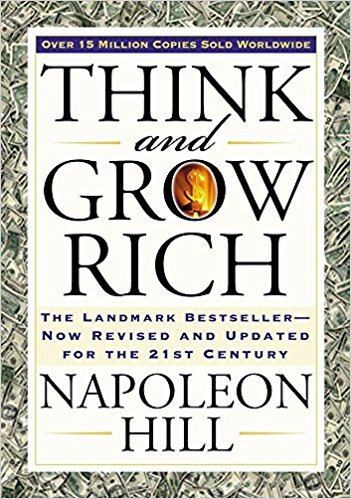Sometimes, life is going to suck, making it difficult to move forward. What you need when this happens is motivation, but self-motivating is difficult. Still, it is the one thing that sets the high achievers apart from the rest.
So, how do you do it? How do you get yourself going when you don’t feel you can go on? Well, today’s video addresses this very topic. So, make sure you stick around to the end to get all our favorite tips.

think and grow rich
by napoleon hill
⏱ 14 minutes reading time
🎧 Audio version available
Understand that motivation is a personal thing.
The first thing to understand about motivation is that it is really personal. So, what works for one might not work for another. It might be a strength or a weakness for you. Regardless, there are always points where motivation becomes difficult.
Design goals rather than tasks
There is more than enough research to prove the power of goal setting. For example, we know from studies that sales people tend to close more deals when they have targets than when they don’t. In the same vein, people who have a daily commitment to exercising tend to exercise more than those who don’t.
So, learn to set concrete goals. It’s imperative that these goals are concrete, as abstract goals are not as effective. Rather than a vague goal of “trying your best,” why not set a goal to take 10,000 steps in a day? Or maybe to get X number of clients for your business daily.
Set goals that you find enjoyable
Now, when setting your goals, ensure that your goal triggers intrinsic motivation. When an activity or a goal is intrinsically motivated, it means that your mind sees the goal or activity as benefiting you, like earning you a reward or keeping you from punishment. Extrinsically motivated goals, on the other hand, are seen as benefiting a separate purpose that does not necessarily affect you directly. So, they typically aren’t as effective.
How do you make sure that your goals are intrinsically motivated? Simple: set goals you find truly enjoyable.
For instance, New Year’s resolutions are an excellent place to start. It’s been proven that people who make resolutions that they find enjoyable at the beginning of January, like say a resolution to take a yoga class, are more likely to be keeping up with their resolutions by March. Those who set less enjoyable goals, on the other hand, more often than not had broken their resolutions by March.
So, how does this relate to work? Well, if we lived in an ideal world, we would all have jobs we absolutely love and we’d never lose our motivation. But this is the real world, so what can we do? Well, on the one hand, keep intrinsic motivation in mind when job hunting or taking on projects. This goes a long way toward ensuring we stay motivated on the job.
But often we don’t end up with our dream jobs. In such cases, you can, at least, find that one aspect of your job you truly do enjoy. Once you’ve found that aspect or couple of aspects, really drill down on them and think about how you can derive maximum satisfaction from accomplishing them.
As for the other less appealing aspects of your work, try to make them as rewarding as you can. So, you could do chores with your friends or family, or listen to your favorite playlist while you sort through that backlog of emails.
Leverage the power of effective rewards
At some point in your career, certain tasks and even certain time periods will make you feel like the weight of the world is on your shoulders. In such unavoidable cases, you might benefit from external motivators. So, say you successfully finish your project, you could make your reward a vacation. Or maybe you hit a milestone on your weight loss journey, you could get something nice for yourself as a reward.
But there’s one thing you shouldn’t do: reward the wrong activity. For instance, if what you care about is the quality of performance you put into your project, rewarding yourself for how many tasks you finished or how quickly you finished those tasks wouldn’t help. You need to make sure the reward matches your activities.
Also, be sure your reward doesn’t undermine the activity you’re rewarding. This means you shouldn’t reward yourself with a large pizza for sticking with your diet. No slacking off at work because you finished your least favourite work task.
Doing this is not truly rewarding as it could keep you from accomplishing other goals by sowing the seeds of procrastination and laziness. So, rather than motivate you to work hard, it could undermine the goal you’ve already achieved and set you back rather than move you forward.
Maintain your progress by breaking down your middle goals into sub-goals
And now for the next step, you want to make sure you maintain the progress you’ve made so far. Usually, when you’re working hard, you begin with a burst of energy. Everything seems possible. But then somewhere in the middle, there’s a slump. This is when most people give up.
For instance, in a study, it was found that observant Jews were more likely to light their menorah on the first and last nights of Hanukkah, even though they were supposed to light it for eight days. Another study involving people cutting paper shapes found that people were more likely to cut corners in the middle of the task than at the beginning or the end.
The good news is you can fight this pattern. One way to do so is to break down your middle tasks, where you usually get the slumps, into smaller, more manageable, tasks. So, rather than have quarterly sales targets, you can break that down into weekly sub-goals instead. This way, you won’t have the time to crumble under the pressure of the famous “slump.”
Another thing you can do is adjust the way you think about your progress. The thing with humans is that we tend to increase our effort when it appears we’re getting closer to our goal. So, adjust the way you think of your project’s timeline, so it feels like you’re further along your timeline. You could do that by moving the starting point of your project in your head further back so your progress feels closer to the end of the timeline.
There’s another strategy to try here. You could focus on what you’ve done so far and then turn your focus to what you have left. In one study, it was found that buyers were more motivated to complete the purchase steps needed to earn a reward when they were informed of how many steps they had already completed and how many more steps were left to complete to earn their reward.
You could try this, especially if you’re performing rote tasks. Even for goals that are more qualitative in nature, like learning to become an accomplished pianist. So, before you get to the middle of your task, count up how many more steps you have to go, and when you hit the middle point, you count down how many steps you have left to meet your goal.
Enlist the help of your circle
Finally, you need the help of others. Humans are social animals, which means we are heavily influenced by the actions of those around us. But here’s the thing, watching others at work stay motivated and get things done can cause one of two reactions in us. We could either get motivated to work harder or just lose all motivation and give up entirely.
So, how do you wing this? When people around you are smashing their goals, don’t just sit idly by, you’ll lose motivation that way. Instead, talk with them and find out what they are doing to accomplish their goals. That might inspire you to get back to work.
Interestingly, you might find that giving advice instead of asking for advice might also help you get motivated. This is because, in giving advice, you lay out plans that you could follow yourself, which can help to increase your drive.
Finally, you might find motivation when you think, not of people doing well in your field, but of close friends and family who share your vision. If you know that your victory is going to translate to a win for someone you care about, it might be easier for you to stay motivated.
So, who are you doing this for? A friend? A child? A parent? Keeping these people in mind, whoever they are, can be just the thing to make sure you keep going. Hopefully, these tips help. Until next time, stay motivated!
What Is Snapreads?

With the Snapreads app, you get the key insights from the best nonfiction books in minutes, not hours or days. Our experts transform these books into quick, memorable, easy-to-understand insights you can read when you have the time or listen to them on the go.


